Homophobic in the Hamptons
Is queer storytelling only palatable in the hands of straight creatives?
While we focus on queer film and television, we’ve always been clear about one thing: the passion is for queer media. That extends to books!
Written by Meg Steinfeld-Heim
When I open TikTok, I will scroll past a video about how to find a nice rich guy in Manhattan to date and not think much of it. I’m sure there are tons of girls out there that are enjoying that advice. Our individual values and belief systems are shaped by countless forces: where we were raised and with how much money, what religion we practiced (if any), who our parents voted for and what they taught us was important. Then we got older and our unique interests and identities emerged. And so, in our modern media landscape, people are popular online for so many different reasons. I’ll stay in my content lane if you stay in yours.
And that’s pretty much what I would ascribe to my understanding of Tinx – a straight American influencer who is known for her male-centered dating advice, hot takes on men, celebrity commentary, and "starter packs for rich moms" Tiktoks. She is just…very, very straight online. Which is fine! My favorite lesbian Norwegian momfluencers probably aren’t on her radar either. So there wasn’t much for me to pay attention to until it was announced that her buzzy debut novel, Hotter in the Hamptons, would be coming out on May 6th.
Hotter in the Hamptons is a steamy summertime romance about fashion influencer Lola Fine who, after deeming something “too lesbian chic” on Instagram, is semi-cancelled. Lola flees to the Hamptons for the summer to recover both her self confidence and her brand. To her chagrin, she finds out that the lesbian cultural critic, Aly Ray Carter, whose scathing profile of Lola sealed her very own semi-cancelled fate, has rented the neighboring house! An enemies to lovers plot unfolds between the two as the ostensibly straight Lola discovers her queerness and gets caught in an intense, sexual whirlwind with Aly.
Sounds like a juicy, fun, queer poolside read to me! Just one little problem: according to Tinx, Hotter in the Hamptons is not a queer book. On more than one occasion, she has either dodged or outright denied that this book is a lesbian or sapphic story. The most explicit acknowledgement from Tinx that I was able to find was in an episode of her podcast, It’s Me, Tinx, where she says, “it’s not a completely… straight romance…hehe”.
I received an ARC of Hotter in the Hamptons from NetGalley and let me make one thing clear: the majority of the romance in this book is queer romance. While there are some other trysts sprinkled throughout, the primary focus of the story is the unfolding romantic dynamic between Lola and Aly, her lesbian neighbor. This discrepancy between what the book so clearly is and how Tinx is choosing to market it has sent my corner of the gay, media-obsessed internet into a tizzy.
On her podcast episode, “Why I Wrote My Book ‘Hotter in the Hamptons’”, Tinx shares that one of the seeds for her novel came from an AMA where a follower wrote in with the question: “Is it okay and normal if I think about women when I’m having sex with my boyfriend? Sometimes I need to think about a woman going down on me in order to finish.” She mentions that another follower asked, “Is it okay if [as a straight woman] I only watch lesbian porn?” Tinx finds this hilarious. Something she said here really jumped out to me – in response to these self-identifying straight women’s queer fantasies, she says reassuringly, almost without thinking: “Whatever you need to think about to c*m is your business. You don’t ever have to confess that to anybody.”
While on the surface, I can agree with the sentiment here, the word choice is baffling. …Confess? Is there something inherently wrong with queer fantasies? Compulsory heterosexuality means that hetero attraction is assumed and expected. But if you are fantasizing about women while in bed with your boyfriend, then honey, the call might be coming from inside the house. And it might not! But comphet should be part of the conversation.
Clip from It’s Me, Tinx
It doesn’t really matter to me how casual Tinx’s tone was here or what her intent was. Her blasé attitude only underscores how her privilege protects her. She doesn’t have to be thoughtful because, from her perspective, the queerness in the story is not the point. In a press interview on the podcast Jeff Lewis Has Issues, Tinx corrects the host, saying, “It’s not a lesbian love story. It is a story of an influencer who gets cancelled, and she goes to the Hamptons and she gets her groove back.”
We live in a diverse world and should always aim to tell diverse stories. To do this, we have to include characters or perspectives that aren’t ours. After all, you have no control over who will pick up your book and have their world shaped by the words you’ve penned. But by writing a predominantly queer romance and reducing it to something as one dimensional as a raunchy summer read for straight women who like lesbian porn, the queerness becomes just something titillating for a straight person to peddle. While queer creators fight harder than ever to carve out space for themselves in this sociopolitical climate, dangerous perspectives like this prove that there is always an appetite for the taboo.
Clip from Jeff Lewis Has Issues
It’s no secret that in the US, we are living through a kind of cultural disintegration. The rise of fascism and the massive influx of conservative leadership in our government means that the systematic stripping of basic human rights for marginalized people has never been easier. And with this comes censorship, in ways both big and small. Mike White and Carrie Coon have publicly discussed that a trans or nonbinary storyline for her character’s child was cut from The White Lotus Season 3, in large part due to the current political climate. A queer man himself, Mike White felt that “it wasn’t the right way to engage with the conversation” as Trump continues to take advantage of the brewing culture war against transgender people. I can only speculate, but the choice to cut this storyline seems like an obvious response to a growing fear of queer narratives and like an unfortunate choice made to protect the art as a whole.
Just last week, the Supreme Court heard cases about picture books featuring LGBTQ+ themes in elementary school classrooms and is likely to rule in favor of censorship and parental opt-out. Friends of mine in publishing are being told that books with queer main characters are getting harder and harder to sell. Even the subtle suggestion that books featuring queer and diverse main characters should be deprioritized in favor of publishing more “profitable possibilities” is bleak. So, when I look at someone with as much influence as Tinx (over 620,000 followers on Instagram) who is publishing an explicitly queer novel but will not identify it as such, my question is this – who gets to tell what stories?
When the news of Hotter in the Hamptons began to circulate, I, like many people, wondered if this was the start of Tinx’s own queer journey. But Tinx has doubled down in the press, saying that she identifies as a straight woman and an LGBTQ+ ally. There is always the possibility that Tinx is queer and not ready to come out. She could still be navigating internalized homophobia. Tinx said on her podcast that she wanted her main character to be tall and curvy with big boobs, because “...that’s what I’m attracted to in women – I love when women look like this.” Her casual approach to this all feels queerbaity, but I recognize that there could be more to the story. But Tinx doesn’t even really acknowledge if the novel was born from a desire to explore her own sexual fantasies. What does it mean to allow someone to come out on their own terms, while they are simultaneously harming a community they may eventually join? Accountability still matters, particularly when you have a massive platform and wide reaching influence. I have no way of knowing what personal revelations lie in store for Tinx, and speculation feels beside the point, so I can only speak to the harm she is currently causing.
Clip from Jeff Lewis Has Issues
Everything about this clip is infuriating: the host asks Tinx these questions in a teasing, unserious tone that tells you precisely how little the authenticity and ownership over a queer story actually matters to him. Tinx sounds like she’s about to slip up and say that she is a “…straight woman who loves gay p[orn]—”, not people. He’s not actually interrogating her; this is just an opportunity for him to capitalize on a potential gotcha moment. This is not important to him.
And if, as the author, you can’t stand by your choice to write a queer story or speak openly about hiring a queer ghostwriter, you can’t claim that you understand the value of diverse storytelling. Focusing on the sexual fantasies of straight women and how they utilize queer women, well…that’s just fetishization. In the above clip, Tinx tells host Jeff Lewis that she did not have a ghostwriter. But actually – that’s not true, Ellen1.
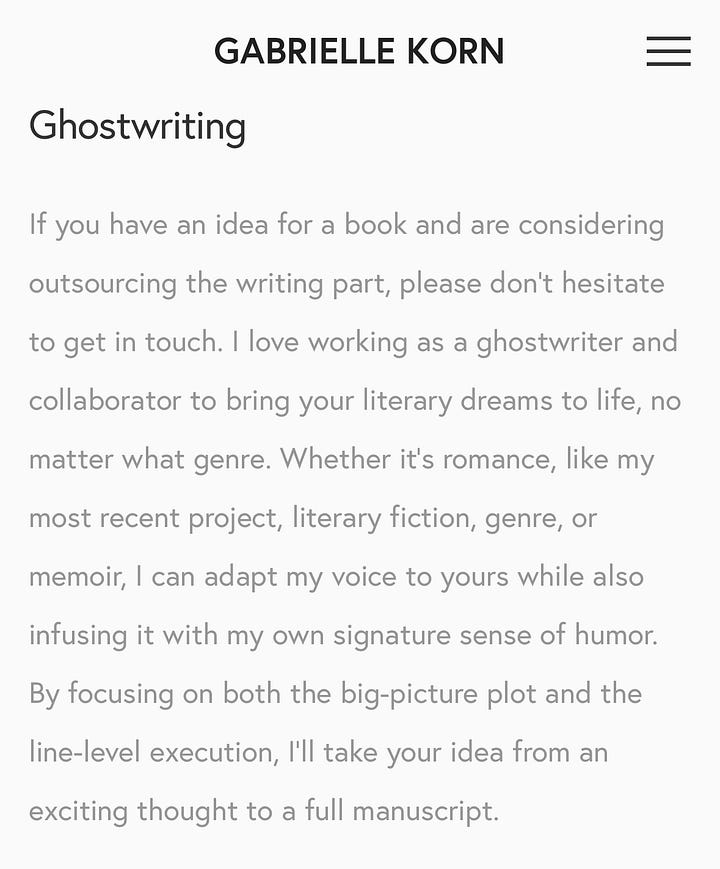
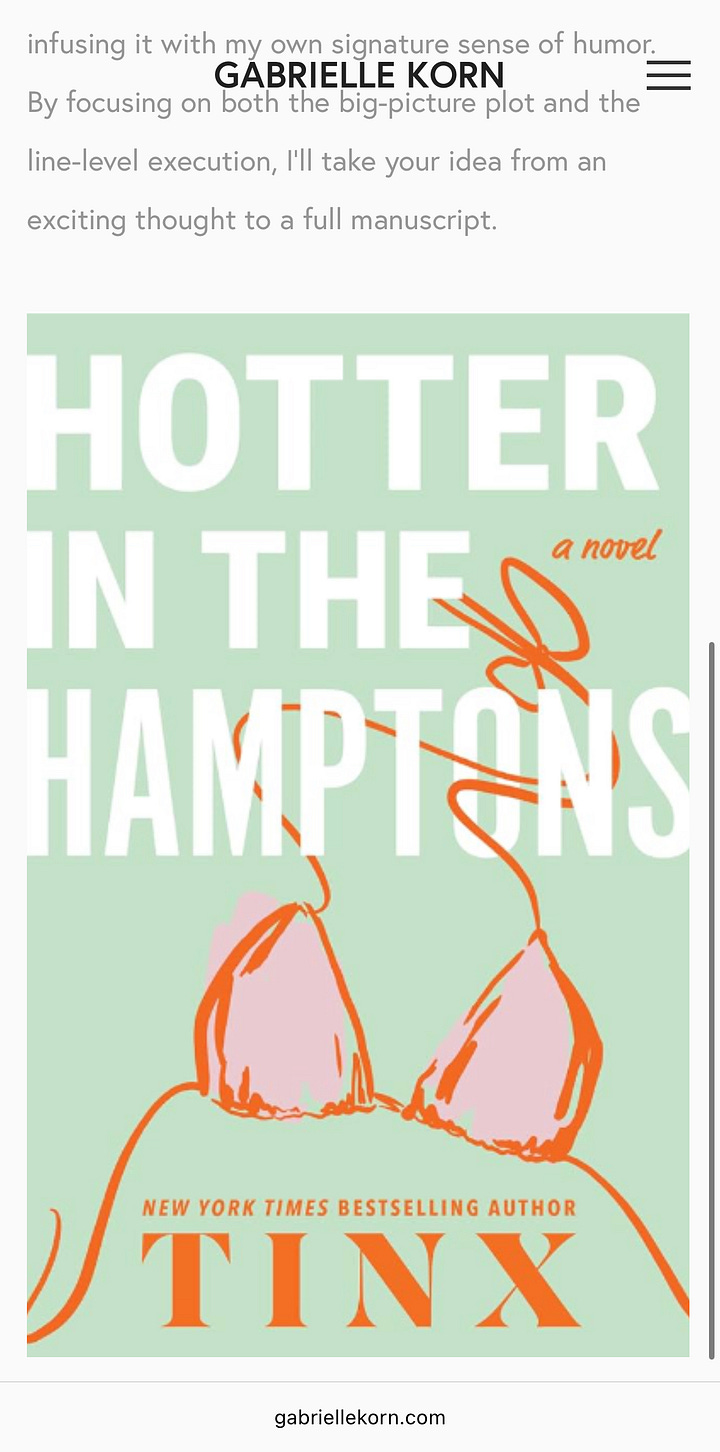
These are screenshots from Gabrielle Korn’s website. Gabrielle Korn is a queer essayist and writer of queer climate fiction. She also offers ghostwriting and manuscript services. Ghostwriting has existed forever – and typically involves an ironclad contract where the ghostwriter is not allowed to discuss their involvement, unless in a strictly professional setting. Gabrielle is listed and thanked in Tinx’s acknowledgements as a “collaborator”. We can’t know exactly how much Gabrielle or Tinx contributed to this story, but we can read it and see that the queer storyline runs through almost the entire book. And we know (see below) that Tinx wanted to nail that “part” of the book. Ghostwriting fiction, particularly when you are also borrowing a POV that isn’t yours, feels a bit like theft to me. Instead of acting in solidarity with queer storytellers, Tinx has chosen to focus on how raunchy and taboo the story is; the result being a sensationalization of queer culture at a time in our country when authentic queer voices are already being suppressed. Ghostwriting contract or not, if I was a queer author whose thoughtful sapphic storytelling was taken out of my hands and given to someone else that I couldn’t trust to speak about it with respect, I’d be a wreck.
I’ve been stuck on something else here too. Somebody with as much influence as Tinx has an entire team of people to help manage her image and inform her professional choices. She has a book agent and an editor at an established publishing house who would both intimately understand the optics of publishing something so far outside of an author’s personal experience. Tinx’s personal accountability aside, it’s impossible these questionable ethics went universally undetected. That is the most insidious part of this; that it was an intentional, conscious choice. Borrowing marginalization to chase clout was intentional.
The collective resistance-fatigue we are all experiencing as a culture is making space for buzzy, problematic cash grabs. What does that say about where we’re headed? Writer and PhD student Maalvika Bhat posted an excellent TikTok discussing this as well. The below is Tinx’s response to Maalvika’s video, where she backtracks after previously denying she used a ghostwriter and acknowledges a hired “collaborator”. The accountability back and forth is not only annoying, it’s just plain sloppy.
And what about the future of queer art in general? If we really are sliding deeper into a dystopian world where diverse art is systematically devalued and suppressed, will vehicles like Hotter in the Hamptons become the only viable option for telling queer stories? It’s grim, but I’m wondering if loopholes like this will become a necessity in future years. Twenty-four years ago, Buffy the Vampire Slayer shocked audiences by including the first ever onscreen kiss between two women in a committed, long-term relationship on television. The now-disgraced creator Joss Whedon described how he snuck this into the show by tucking the moment into a heavy episode about death and using vague language in the script that the WB executives wouldn’t pick up on (“Tara comforts Willow”). This was the first time that Willow and Tara were able to be physically intimate on screen after being in a relationship for nearly two seasons. While there are plenty of criticisms to be made about how their relationship was handled as a whole, at the time this was revolutionary. This depiction of intimacy was only possible because it was buried. Is this what we’re heading back to?
Hotter in the Hamptons has been optioned for television by creator/sister duo Erin and Sara Foster (of Netflix’s recent hit Nobody Wants This). The Deadline article says that a search is underway for a writer to pen the adaptation. Do we think the actual queer voice behind this novel is being considered? Also, if your gay spidey senses are tingling, then allow me to remind you – back when she was starting out her writing career working on Ryan Murphy’s very queer sitcom The New Normal, Erin Foster was in a relationship with lesbian musician Samantha Ronson. Later, in their faux reality TV show Barely Famous, which was based on the sisters’ lives, Erin describes her past queer relationship as a “blip”: “I’m not confused about my sexuality at all. I mean, I had a blip a couple of years ago…I was a lesbian for a minute, but now I’m all D.” I’m tempted to point out the irony here, but also–is it even irony? Or have they found common ground in how inconsequential queerness is to them?
It’s great that another queer book exists, and that a queer writer got paid to write it. And the book is great –Tinx and Gabrielle’s collaboration brought a fun, sexy queer romp with a strong story heart into the world. That is worth something. But there is a six city book tour lined up to share the intricacies of this novel with readers all over the country and the person who will be leading those conversations won’t even acknowledge its queerness.
If Tinx is the ally she claims to be, then there is an opportunity here to properly honor Gabrielle’s contributions by amplifying her own novels or co-hosting a book tour stop as collaborators. The two writers could do a joint interview to speak to their mutual interest in writing an informed queer story. Gabrielle could join the writers room for the TV adaptation of Hotter in the Hamptons. Instead, Tinx’s name, platform and reach as an influencer is what will rocket up the sales of Hotter in the Hamptons and add the Hollywood heat necessary to get a TV show on the air.
To close out this episode of her podcast, Tinx says, “I just want it [the book] to be fun and horny. It’s not that deep.” And the thing is–there should be fun queer books out there that are horny and not that deep. But it is Tinx’s repeated refusal to acknowledge the story for what it is that makes this a much bigger conversation. Her approach to handling this has been flippant, unconcerned, and even defensive; none of which is validating to a queer audience.
Clip from It’s Me, Tinx
Is this a voice we can trust to tell our stories? Be they horny, raunchy, reserved, cerebral, poolside or in the classroom…we can ask for a little more.
Allegedly


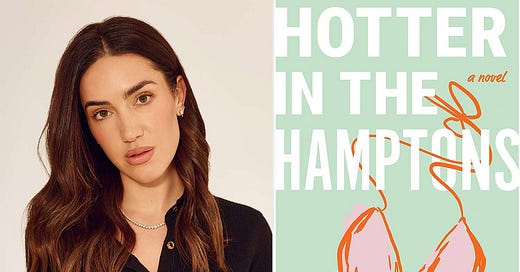





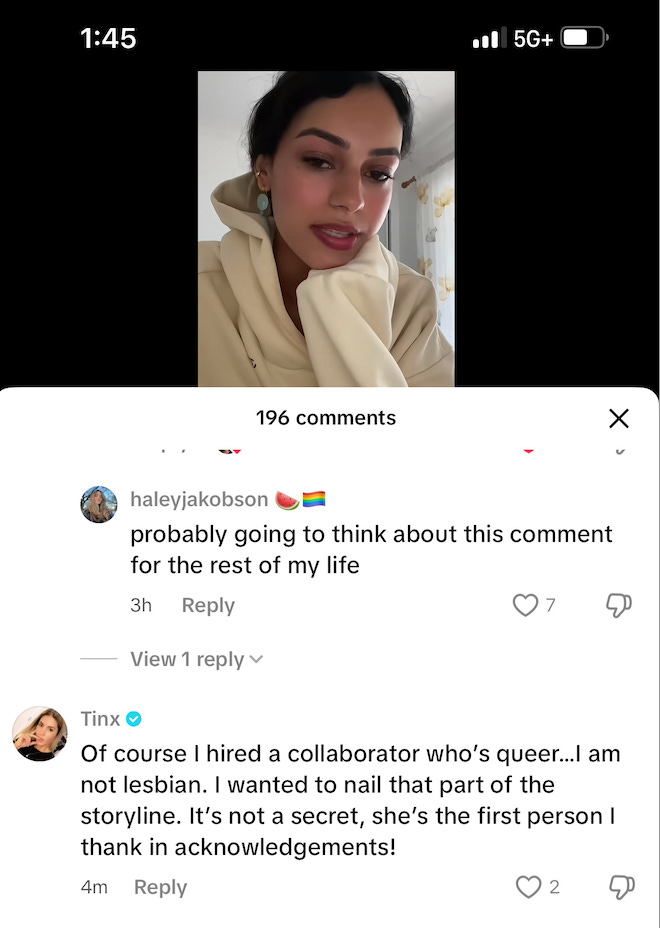
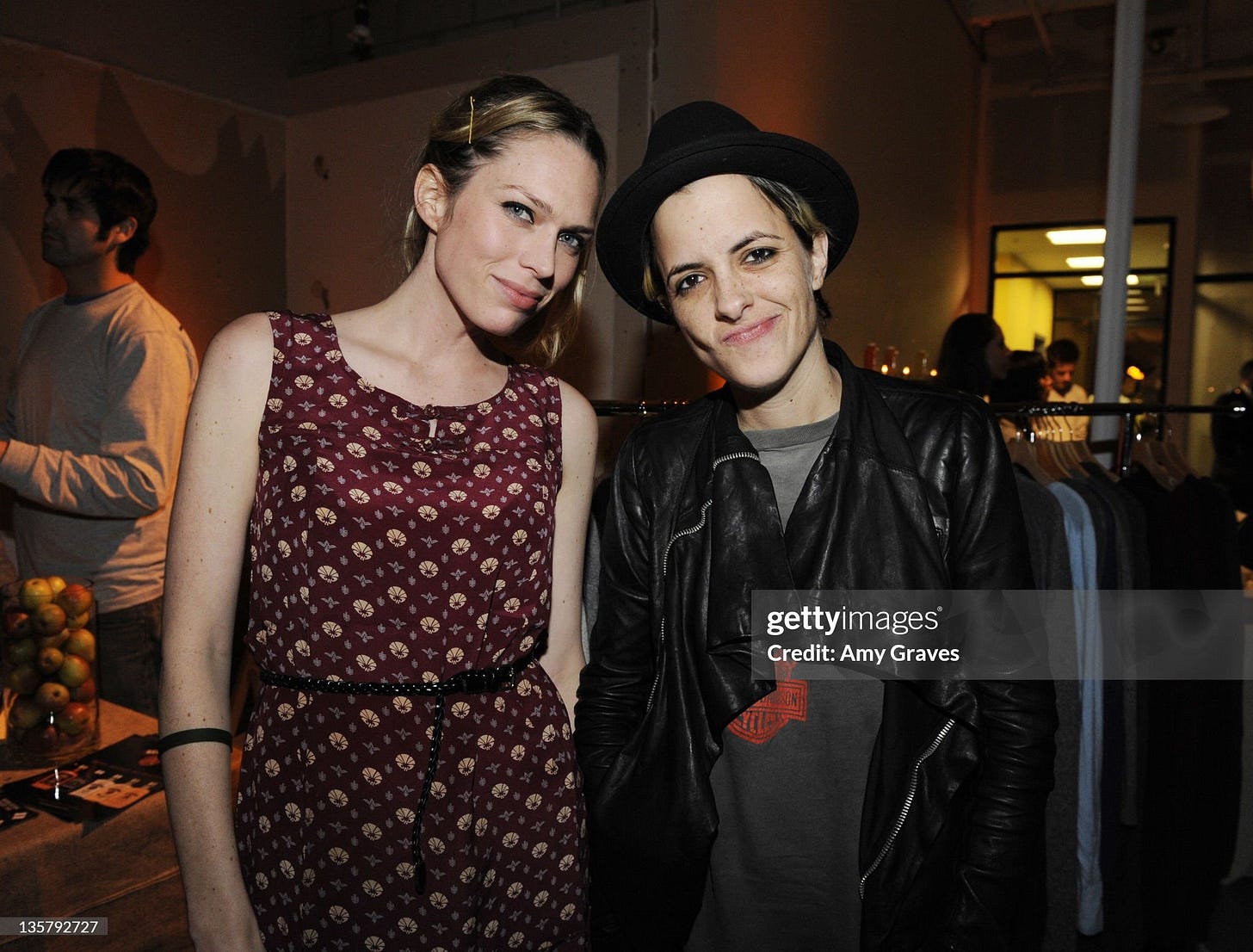

Thank you for writing about this. Tinx's comments about queer women and queer desire over the years make her values clear, and I'm disappointed in the romance bookstores and community leaders highlighting this book over the work of actual queer writers who are struggling to get their stories heard.
This essay is written with such nuance and is so deeply important. Thank you for putting so much effort to parsing out this really frustrating and demoralizing situation.